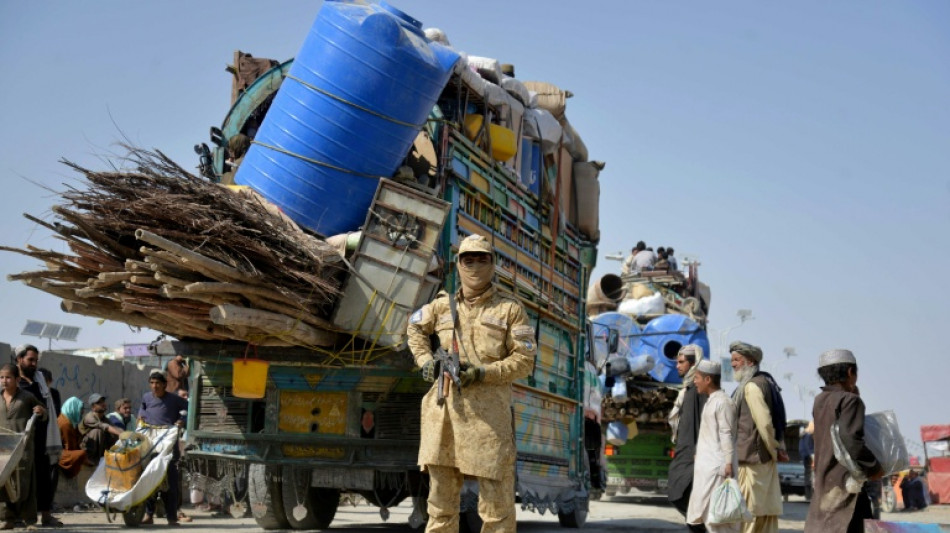
-
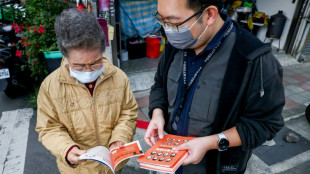 Taiwan issues 'crisis' guide on preparing for disasters, Chinese attack
Taiwan issues 'crisis' guide on preparing for disasters, Chinese attack
-
Washington's abandoned embassies have stories to tell

-
 Maxey powers Sixers over Bucks as Spurs beat Hawks
Maxey powers Sixers over Bucks as Spurs beat Hawks
-
Barca hoping Camp Nou return can spark Liga title defence

-
 All Blacks bid to bounce back for season-ender against struggling Wales
All Blacks bid to bounce back for season-ender against struggling Wales
-
Pogba set for long-awaited comeback as Ligue 1 returns

-
 Inter and Milan in early Scudetto clash as Napoli attempt to bounce back
Inter and Milan in early Scudetto clash as Napoli attempt to bounce back
-
How England revived their rugby fortunes

-
 A big deal: Robert Therrien's huge sculptures on show in LA
A big deal: Robert Therrien's huge sculptures on show in LA
-
In U-turn, US rights report to track gender changes, DEI

-
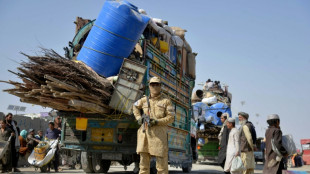 Afghanistan seeks new trade routes as Pakistan ties sour
Afghanistan seeks new trade routes as Pakistan ties sour
-
Iranian director Jafar Panahi ramps up French Oscars campaign

-
 Cuba battles virus outbreak despite shortages of food, medicine
Cuba battles virus outbreak despite shortages of food, medicine
-
30-plus nations oppose COP30 draft over fossil fuel omission: Colombia

-
 Tech firms lead Asian stock rout as AI bubble fears linger
Tech firms lead Asian stock rout as AI bubble fears linger
-
Ukraine would give Russia chunk of territory under 28-point US plan

-
 England win toss, bat in first Ashes Test
England win toss, bat in first Ashes Test
-
Teen saving India's ponds says everyone can be a leader

-
 Frida Kahlo painting auctions for $54.6 mn, record for woman artist
Frida Kahlo painting auctions for $54.6 mn, record for woman artist
-
Arsenal brace for Spurs clash without Gabriel, Man City in pursuit

-
 Scramble for Sudan's resources fuels brutal civil war
Scramble for Sudan's resources fuels brutal civil war
-
Livestream giant Twitch to ban under-16s in Australia

-
 Ukraine would cede Donbas to Russia under 28-point US plan
Ukraine would cede Donbas to Russia under 28-point US plan
-
Spain and Germany reach Davis Cup semi-finals

-
 'Black Panther' star Chadwick Boseman gets Hollywood star
'Black Panther' star Chadwick Boseman gets Hollywood star
-
Trump plans massive expansion of offshore oil drilling

-
 South Korean Lee So-mi grabs LPGA Tour Championship lead
South Korean Lee So-mi grabs LPGA Tour Championship lead
-
Fire breaks out at UN climate talks, forcing delay at critical phase

-
 Carpenter strikes for Chelsea but Barca hold on for draw in Women's Champions League
Carpenter strikes for Chelsea but Barca hold on for draw in Women's Champions League
-
Rams-Bucs and Steelers-Bears match NFL division leaders

-
 ExxonMobil relaunches natural gas project in Mozambique
ExxonMobil relaunches natural gas project in Mozambique
-
Colombia's Petro in hot water as records reveal Lisbon strip club visit

-
 Stocks lose steam on AI concerns as jobs data cloud rate cut hopes
Stocks lose steam on AI concerns as jobs data cloud rate cut hopes
-
Messi's Inter to open Miami stadium in April against Austin

-
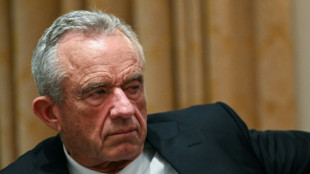 US health agency edits website to reflect anti-vax views
US health agency edits website to reflect anti-vax views
-
US denies ending South Africa G20 boycott
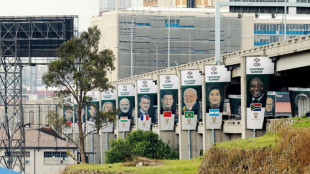
-
 Iniesta's company rebranding Israel Premier Tech cycling team
Iniesta's company rebranding Israel Premier Tech cycling team
-
US plan 'good' for Russia, Ukraine: White House

-
 Piastri ready to forget struggles and enjoy Vegas GP
Piastri ready to forget struggles and enjoy Vegas GP
-
US peace plan 'good' for Russia, Ukraine: White House
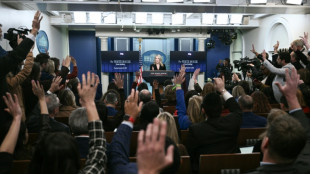
-
 Researchers stunned by wolf's use of crab traps to feed
Researchers stunned by wolf's use of crab traps to feed
-
Colombia shows first treasures recovered from 300-year-old shipwreck

-
 England's Daly ready for aerial challenge against Argentina
England's Daly ready for aerial challenge against Argentina
-
Covid inquiry finds UK inaction cost thousands of lives

-
 Italy probes Tod's executives over labour exploitation
Italy probes Tod's executives over labour exploitation
-
Trump floats death penalty for 'seditious' Democrats

-
 Fire forces evacuation at UN climate talks
Fire forces evacuation at UN climate talks
-
South Africa says US asks to join G20 summit, ending boycott
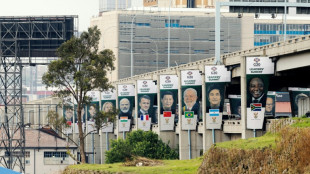
-
 Montpellier deny 'racism' allegations in Fowler's book
Montpellier deny 'racism' allegations in Fowler's book
-
UK Covid inquiry says thousands of lives could have been saved


Afghanistan seeks new trade routes as Pakistan ties sour
Afghanistan is scrambling to diversify its trade partners after a deadly border clash with Pakistan last month brought ties to their lowest point in years, affecting people on both sides of the frontier.
The South Asian neighbours have been locked in an increasingly bitter dispute since the Taliban took over Kabul in 2021, with Islamabad accusing Afghanistan of harbouring the militants behind cross-border attacks -- charges the Taliban government denies.
Abdul Ghani Baradar, Afghanistan's deputy prime minister for economic affairs, urged traders last week to "redirect their trade toward other alternative routes instead of Pakistan".
Pakistan is landlocked Afghanistan's top trading partner, supplying rice, pharmaceuticals and raw materials, while taking in 45 percent of Afghan exports in 2024, according to the World Bank.
More than 70 percent of those exports, worth $1.4 billion, are perishable farm goods such as figs, pistachios, grapes and pomegranates.
Dozens of Afghan trucks were stranded with rotting produce when the frontier shut on October 12 due to deadly cross-border fire, which was followed by a fragile truce.
Losses have topped $100 million on both sides, and up to 25,000 border workers have been affected, according to the Pakistan Afghanistan Joint Chamber of Commerce and Industry (PAJCCI), which seeks to promote bilateral trade.
Baradar warned traders that Kabul would not intervene if they kept relying on Pakistan.
Wary of further disruptions, the Taliban government is now hedging its bets with Iran, Central Asia -- and beyond.
- Pomegranates to Russia -
Trade with Iran and Turkmenistan has jumped 60–70 percent since mid-October, said Mohammad Yousuf Amin, head of the Chamber of Commerce in Herat, in western Afghanistan.
Kabul also sent apples and pomegranates to Russia for the first time last month.
Russia is the only country to have officially recognised the Taliban administration.
Taliban leaders crave wider recognition and foreign investment, but sanctions on senior figures have made investors wary.
The vast market in India is a prime attraction. On Sunday, state-owned Ariana Afghan Airlines cut freight rates to the country of 1.4 billion people.
Two days later, Kabul sent its commerce and industry minister to New Delhi.
"Afghanistan has too many fruits and vegetables it cannot store because there are no refrigerated warehouses," said Torek Farhadi, an economic analyst and former IMF adviser.
"Exporting is the only way," he told AFP. And quickly, before the products spoil.
Kabul touts Iran's Chabahar port as an alternative to Pakistan's southern harbours, but Farhadi noted it is farther, costlier and hampered by US sanctions on Tehran.
- 'Distraught' -
"It's better for both countries to end this trade war... They need each other," Farhadi said.
Afghanistan relies on Pakistan's market of 240 million people and its sea access, while Islamabad wants Afghan transit to reach Central Asia for textile and energy trade.
Pakistan says the closure curbs militant infiltration, but its economy is also feeling the pinch.
In Peshawar, near the frontier, Afghan produce has all but vanished from markets.
Grapes cost four times more, and tomatoes have more than doubled to over 200 rupees (70 cents) a kilogram, an AFP correspondent found.
On Monday, the PAJCCI urged Islamabad to act, warning of mounting costs as shipping containers bound for Afghanistan and Central Asia remain stuck in Pakistan.
Each container is racking up $150–$200 in daily port charges, the group said, adding: "With thousands of containers stuck, the collective economic burden has become unbearable and continues to grow with each passing day."
Truck driver Naeem Shah, 48, has been waiting at the Pakistani border town of Chaman with sugar and cooking oil bound for Afghanistan.
"I haven't been paid for a month. No matter who I call, they say there is no money because the border is closed," he told AFP.
"If it doesn't reopen, we will be distraught."
D.Kaufman--AMWN